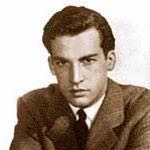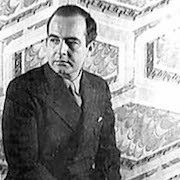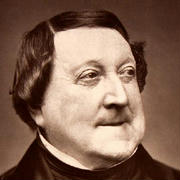Gian Carlo Menotti (, Italian: [dʒaŋ ˈkarlo meˈnɔtti]; July 7, 1911 – February 1, 2007) was an Italian-American composer, librettist, director, and playwright who is primarily known for his output of 25 operas. Although he often referred to himself as an American composer, he kept his Italian citizenship. One of the most frequently performed opera composers of the 20th century, his most successful works were written in the 1940s and 1950s. Highly influenced by Giacomo Puccini and Modest Mussorgsky, Menotti further developed the verismo tradition of opera in the post-World War II era. Rejecting atonality and the aesthetic of the Second Viennese School, Menotti's music is characterized by expressive lyricism which carefully sets language to natural rhythms in ways that highlight textual meaning and underscore dramatic intent.
Like Wagner, Menotti wrote the libretti of all his operas. He wrote the classic Christmas opera Amahl and the Night Visitors (1951), along with over two dozen other operas intended to appeal to popular taste. Many of Menotti's operas enjoyed successful runs on Broadway, including two Pulitzer Prize winning works, The Consul (1950) and The Saint of Bleecker Street (1955). While all of his works used English language libretti, three of his operas also had Italian language libretti penned by the composer: Amelia Goes to the Ball (1937), The Island God (1942), and The Last Savage (1963). He founded the Festival dei Due Mondi (Festival of the Two Worlds) in Spoleto in 1958 and its American counterpart, Spoleto Festival USA, in 1977. In 1986 he commenced a Melbourne Spoleto Festival in Australia, but he withdrew after three years.
In addition to his operas, Menotti wrote music for several ballets, numerous choral works, chamber music, orchestral music of varying kinds including a symphony, and stage plays. Notable among these is his cantata The Death of the Bishop of Brindisi, written in 1963, and the cantata Landscapes and Remembrances in 1976 – a descriptive work of Menotti's memories of America written for the United States Bicentennial. Also worthy of note is a small Mass commissioned by the Roman Catholic Archdiocese of Baltimore – Mass for the Contemporary English Liturgy.
Menotti taught music composition on the faculty of the Curtis Institute of Music from 1948–1955. He also served as the Artistic Director of the Teatro dell'Opera di Roma from 1992–1994, and directed operas periodically for notable organizations such as the Salzburg Festival and the Vienna State Opera.















